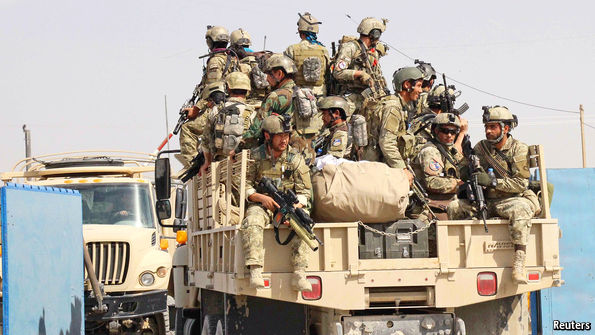Putin dares, Obama dithers
The danger of Russia’s intervention in Syria, and America’s timidity in Afghanistan

TO HEAR Vladimir Putin, Russia has become the leader of a new global war on terrorism. By contrast Barack Obama seems wearier by the day with the wars in the Muslim world that America has been fighting for more than a decade. On September 30th Russian jets went into action to support Bashar al-Assad’s beleaguered troops. It is setting up an intelligence-sharing network with Iraq and Iran. The Russian Orthodox church talks of holy war. Mr Putin’s claim to be fighting Islamic State (IS) is questionable at best. The evidence of Russia’s first day of bombing is that it attacked other Sunni rebels, including some supported by America. Even if this is little more than political theatre, Russia is making its biggest move in the Middle East, hitherto America’s domain, since the Soviet Union was evicted in the 1970s.
Both Kunduz and Russia’s bombing are symptoms of the same phenomenon: the vacuum created by Barack Obama’s attempt to stand back from the wars of the Muslim world. America’s president told the UN General Assembly this week that his country had learned it “cannot by itself impose stability on a foreign land”; others, Iran and Russia included, should help in Syria.
That is the story in the Middle East. In Iraq Mr Obama withdrew troops in 2011. In Syria he did not act to stop Mr Assad from wholesale killing, even after he used poison gas. But when IS jihadists emerged from the chaos, declared a caliphate in swathes of Iraq and Syria, and began to cut off the heads of their Western prisoners, Mr Obama felt obliged to step back in—desultorily. In Afghanistan Mr Obama is making the same mistake of premature withdrawal. As NATO’s combat operations wound down into a mission to “train, advise and assist”, Mr Obama promised that the last American troops would leave Afghanistan by the end of 2016. The date had no bearing on conditions in Afghanistan but everything to do with when Mr Obama leaves the White House.
ARTICLE HERE
Both Kunduz and Russia’s bombing are symptoms of the same phenomenon: the vacuum created by Barack Obama’s attempt to stand back from the wars of the Muslim world. America’s president told the UN General Assembly this week that his country had learned it “cannot by itself impose stability on a foreign land”; others, Iran and Russia included, should help in Syria.
That is the story in the Middle East. In Iraq Mr Obama withdrew troops in 2011. In Syria he did not act to stop Mr Assad from wholesale killing, even after he used poison gas. But when IS jihadists emerged from the chaos, declared a caliphate in swathes of Iraq and Syria, and began to cut off the heads of their Western prisoners, Mr Obama felt obliged to step back in—desultorily. In Afghanistan Mr Obama is making the same mistake of premature withdrawal. As NATO’s combat operations wound down into a mission to “train, advise and assist”, Mr Obama promised that the last American troops would leave Afghanistan by the end of 2016. The date had no bearing on conditions in Afghanistan but everything to do with when Mr Obama leaves the White House.
ARTICLE HERE

No comments:
Post a Comment